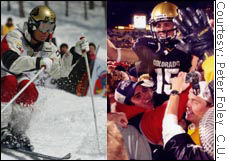
NEW YORK (CNN/Money) - The NCAA has a full slate of problems to look into at the University of Colorado: allegations of rape, use of strippers to entice recruits and freestyle moguls skiing at the highest level.
So far, the organization in charge of setting standards for collegiate athletics has made the most progress trying to stamp out world-class skiing.
The issue involves Jeremy Bloom, a wide receiver and kick returner at Colorado, who is also a member of the U.S. Ski Team in moguls skiing. Bloom won the World Cup in freestyle skiing in 2002, and was a member of the Olympic team that year. He hopes to compete for the gold at the 2006 Olympics.
 |
|
| Jeremy Bloom's dream of competing in both mogul skiing and football are being tripped up by NCAA endorsement rules. |
To do so, he estimates it will cost $100,000 a year, in addition to the support he gets from the U.S. team.
"It's extremely expensive," said Larry Bloom, his father and manager, a professor at CU rival Colorado State University. "You need a private coach, trainers, allied health people, travel expenses. It gets quite costly."
To raise the money, Bloom needs to turn to equipment makers for endorsement deals. They are eager to sign him up, as they have other stars in the sport.
The problem for Bloom is that he's good at two sports -- and one of them is regulated by the bureaucrats at the NCAA.
| SportsBiz
|

|
| Click here for SI.com sports coverage
|
|
|
|
The NCAA allows athletes to be professional in one sport and still be eligible to play in college as an amateur in another sport. Several college football players have spent their summers as minor league baseball players, for example. But the rules prohibit endorsing any kind of product, even if it's ski equipment not used in amateur sport.
"They allow the amateurs to have an unrestricted professional salary," notes Larry Bloom. "But most of the sports sanctioned by the International Olympic Committee don't pay salaries."
Jeremy was on his way to the Czech Republic for a World Cup competition this week and not available for comment.
Movie star looks
In January, Bloom signed his first deal, to appear in a print and outdoor advertisement for the Equinox chain of health clubs. His movie star looks helped get him the job.
 |
|
| This health club ad may be enough to keep Bloom off the football field this season. |
"We thought about people who pushed the physical side of their life to their limits," said David Lipman, the New York advertising executive who picked Bloom for the campaign.
Lipman said the athlete was paid "well under six-figures" for the spot.
NCAA officials say that they must fight the rule or else open the door to all manner of professionalism by star collegians.
They point out that Bloom is allowed to accept prize money from his skiing competition, and that even collegiate athletes who are professionals can't accept endorsements in their paid sport. A minor league baseball player can't do promos for a bat company if he wants to compete in NCAA football, for example.
"(Bloom's) agents have wanted him to start this endorsing business. I can understand why. He's a good looking kid who's got a great deal of appeal," said Wally Renfro, assistant to NCAA president Myles Brand. "But they're marketing him as a two-sport athlete."
Equinox's Lipman confirms as much. "The fact that he competes in two sports was interesting to us," he said.
Looking into endorsement rules
An NCAA committee will take a look at endorsement rules this June. But until any changes are approved by member schools, Renfro argues, it is important to enforce the rules equally across all schools and sports. "A court would be wrong to put him in a class all by himself," he said.
It seems clear that litigation will settle the question. Bloom went to court to fight the rule in 2002 before he started playing football at CU, but lost that case. In April he's set to ask the Court of Appeals in Colorado to overturn that decision. If he loses, it probably means the end of his college football career.
YOUR E-MAIL ALERTS
|
Follow the news that matters to you. Create your own alert to be notified on topics you're interested in.
Or, visit Popular Alerts for suggestions.
|
|
|
 |
"If the courts do not rule in favor of the appeal and the NCAA declares him ineligible, then so be it," said Bloom's father. "He desires to continue playing for Colorado, but he's at peace with his part of what he can control."
It would be a shame if it comes to that.
Schools and the NCAA itself are paid millions in sponsorship deals from companies eager to be associated with college sports. Coaches are paid to wear logos on the apparel they wear during the games. Some even get cash from the makers of the footwear their players use.
In light of all that, it is difficult to accept the NCAA cracking down on Bloom because of the way money is allocated in his chosen sport.
The problem with collegiate athletics isn't whether or not money is going to the athletes. The real problem is the effort the NCAA makes to maintain the facade of amateurism in sports that long ago ceased to be amateur.

|

